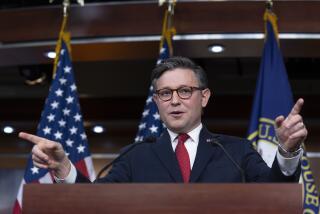Threat of government shutdown raises anxiety across country
With the threat of a government shutdown only hours away, Robyn Knutson on Friday decided to take control: She raced from Orange County to the Federal Building on Los Angeles’ Westside and got in line at the passport office.
“We didn’t want to take the risk, so we ran up here as quickly as we could,” said Knutson, whose 12-year-old son needed an expedited passport for a school trip to Fiji in three weeks. “It’s been stressful.”
Even though congressional negotiators and the White House reached agreement on a spending bill in the final hours, the possibility of a midnight shutdown was enough to raise the anxiety level among many Americans to bright red. For federal employees, the time had come to mobilize shutdown plans — even if they had to ditch them at the last minute.
Across the country’s 394 national parks, employees busied themselves with pre-staging barricades near entrance gates and making “Closed” signs, as rangers spent another day unable to answer tourists’ most pressing query: Will the park be open Saturday?
Hundreds of thousands of federal workers, including 177,000 civilian employees in California, wondered whether they would work. Some members of Congress churned out news releases pledging to forgo their congressional pay accrued during a shutdown.
The potential shutdown quickly turned into a trending topic on social media. Twitter was cluttered with shutdown jokes and a thread of shutdown pickup lines. (Favorite: “Are you furloughnsome tonight?”)
Rep. Michael M. Honda (D-San Jose) sought to reassure his constituents on his website that “laws would still be enforced, emergencies responded to, and our country defended” in the event of a shutdown.
As agencies issued contingency plans for an orderly shutdown — the Commerce Department’s instructions ran 68 pages — federal employees tried to work while monitoring the news on budget negotiations. And they steeled themselves for the unthinkable: having to turn off their government-issued BlackBerrys. NASA tweeted that in the event of shutdown, it would not be tweeting.
“There’s a lot of anxiety,” said Daniel Sobien, a weather forecaster in Florida and president of the National Weather Service Employees Organization. As angry and frustrated as he and his fellow employees were, he said, “I keep thinking about the guy in Afghanistan right now, with bullets flying past his head, thinking of whether he can make the mortgage at home because he doesn’t know if he’s going to get paid.”
Military personnel would have received their full pay in a shutdown, but it would have been delayed.
At snowbound Yellowstone, park spokesman Al Nash said the staff prepared to place fliers on cars parked near trail heads leading to backcountry, where he said 11 “hardy souls” were camping in the frigid wilderness. The leaflets, he said, were to inform the out-of-touch hikers that the park was closed and that they should leave.
Yosemite park personnel readied signs that they hoped would discourage intrepid tourists.
Winter is the busiest season, however, at Death Valley, where the park’s seven campgrounds were jammed with visitors on spring break. Terry Baldino, the park’s chief of interpretation, said staff members spent Friday puzzling how to “close” the largest national park outside of Alaska. Death Valley’s 3.3 million acres is laced with roads, most of which Baldino said would be “signed, posted or gated,” but not all.
At the Los Angeles passport office, Christian McClelland had rushed from Brea to apply for a passport for his August cruise to Central America. But he didn’t have an appointment and was told he couldn’t get one until next week.
“Then they told me they don’t know if they will actually be open,” McClelland said as he made his way back to the parking lot. “There is nothing we can do about it, but we are the ones being affected by it. It’s frustrating.”
Like other tourists in Washington on Friday, Tracy Kateridge of Long Island, N.Y., crammed in multiple museum visits, worried that the doors would be closed Saturday.
“We tried to make sure we got to the museums in today,” she said while taking in the National Museum of American History.
Ceasar and Cart reported from Los Angeles. Times staff writers Julie Mianecki and Richard Simon of the Washington bureau contributed to this report.
More to Read
Start your day right
Sign up for Essential California for news, features and recommendations from the L.A. Times and beyond in your inbox six days a week.
You may occasionally receive promotional content from the Los Angeles Times.








